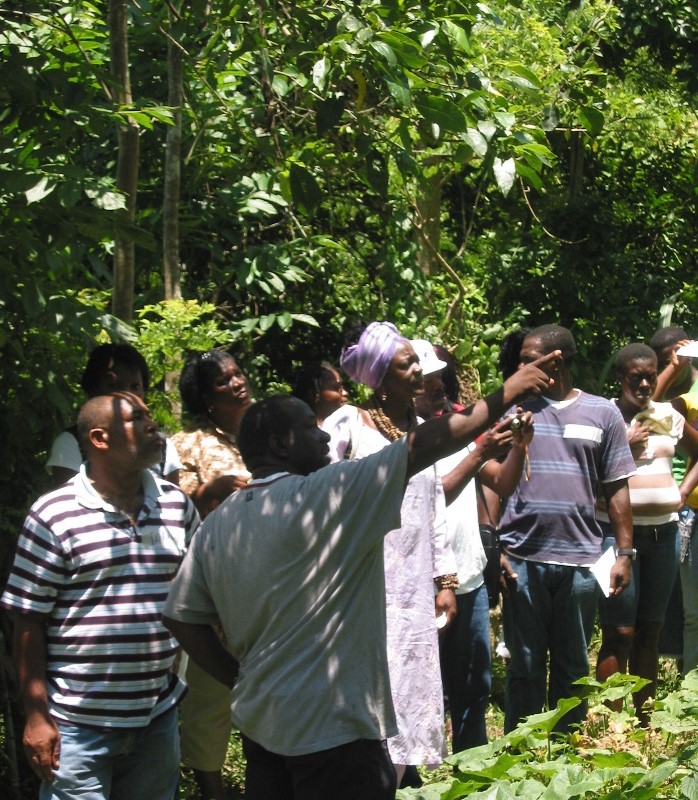Participatory budgeting and financial management for the forest sector in Jamaica

Port-of-Spain, March 3, 2022 – Building the awareness and capacity of civil society organisations (CSOs) to engage in participatory budgeting and financial management for the forest sector in Jamaica is the focus of a new two-year project being funded by the European Union (FED/2021/428- 620) and implemented by the Caribbean Natural Resources Institute (CANARI) and its co-executing partners, the Caribbean Coastal Area Management (C-CAM) Foundation, and the Jamaica Conservation Development Trust (JCDT).
The project will support recommendations outlined in the 2017 report on updating Jamaica’s Public Finance Management Reform Action Plan to increase public access to fiscal information. This is part of the approach to strengthening the government’s public finance management to improve governance and accountability, fiscal control, efficiency and effectiveness in resource use. The project will raise public awareness of public finance management issues and ensure that civil society groups can play a role in the budgetary cycle and delivery of the National Forest Management and Conservation Plan.
Over the period December 2021 to November 2023, CANARI, together with C-CAM and JCDT, will spearhead the establishment of a coalition of Jamaican CSOs, and work with them to ensure they have the skills, abilities and resources to engage in collective analysis, advocacy and
dialogue with key government agencies to promote the development of mechanisms for public finance management for the forest sector. As part of the project, CANARI and its partners will also develop a public awareness raising campaign and carry out research and training to ensure key CSOs working in the forest sector can continue to engage relevant government agencies and play a role in formulating and executing national budgets that support forest management. These activities will greatly improve citizens’ engagement in, and support for, the sustainable management of forest ecosystems and biodiversity in Jamaica to benefit livelihoods, socio-economic development, and human well-being.
The project targets Jamaican CSOs that have interests, rights, and responsibilities in forest research, conservation and management, including the co-management of forested protected areas, or advocate for sustainable forest management, conservation and restoration. According to the executive director of C-CAM, Ingrid Parchment, “This initiative is a good opportunity for stakeholders involved in the management and use of the forest to be involved in the decision making about how funds are allocated and budgeted to conserve those resources.”
Additionally, the project will engage public sector forest managers, policy makers and budget decision-makers, including key government agencies such as the Forestry Department and the National Environmental Protection Agency (NEPA). “This project has the potential to change the way we think about and manage our forest resources in Jamaica, in addition to building capacity to better address national issues impacting our forests,” commented JCDT’s executive director, Dr. Susan Otuokon.
Project activities will, by extension, benefit the Jamaican public dependent on forest ecosystem services through improvements made in conserving, protecting and financing those services.
About CANARI: The Caribbean Natural Resources Institute (CANARI) is a regional technical non-profit institute which has been working across the Caribbean islands for more than 30 years. Our mission is to promote and facilitate stakeholder participation in the stewardship of natural resources in the Caribbean. Our work focuses on Biodiversity and Ecosystems, Equity and Justice, Participatory Governance and Resilience. For more information, see: http://www.canari.org/
END
About C-CAM: The Caribbean Coastal Area Management Foundation (C-CAM) was established in 1997 to promote coastal conservation in Jamaica. C-CAM promotes sustainable development and conservation of the natural environment in the Portland Bight Protected Area. The organisation’s approach to natural resources management is based on the maximum involvement of communities though co-management based on the best available scientific and social information. For more information, see https://ccam.org.jm/
About JCDT: Established in 1988, The Jamaica Conservation and Development Trust (JCDT) is a non- governmental organization and charity with a mandate to conserve Jamaica’s natural environment. The JCDT’s mission leads the organisation to protect and restore forests in the Blue and John Crow Mountains using approaches that facilitate sustainable development in rural mountain communities. For more information, see https://www.jcdt.org.jm/





